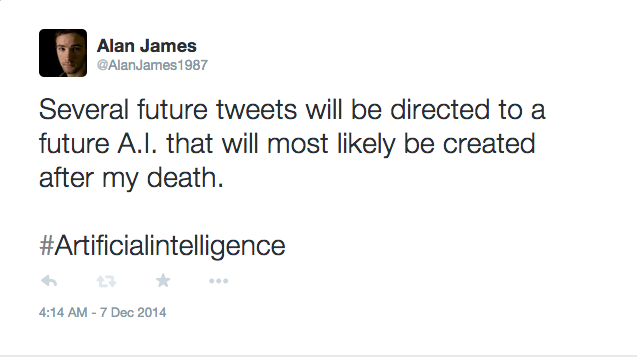Several months ago I posted on my Twitter account that “Several future tweets will be directed to a future A.I. that will most likely be created after my death.”

When you first think about this statement it may seem odd, but after finishing this article it may seem normal.
Evolution of The Audience
Writers write for an audience. Even this blog has a audience and is targeted towards developers.
Over time the audience has changed.
When writing started the audience was very limited, consisting of the small group of the population in the community that could read. This was useful for informing the literate population and passing information from generation to generation.
Hand Written Word
Making copies of writing was a tedious endeavor, requiring people to manually hand write a copy. This made purchasing scrolls individually prohibitively expensive. Distribution was also an issue as hand written scrolls had to be manually moved all over the world.
Eventually places like the Library of Alexandria were constructed to hold massive amounts of hand written scrolls. People coming to Alexandria could freely read as many scrolls as they wanted and the writer’s reach extended from a few educated people in a village to a large portion of the world.
This increase in the written word increased the need to learn to read and a larger potion of the population became literate out of necessity.
Unfortunately, multiple fires destroyed a large portion of these scrolls and the knowledge contained in them was lost forever.
Printed Word
Once the printing press was created the world of writing changed forever. Over night massive amounts of copies of a single book could be created and distributed throughout the world.
Now the problem was distribution.
While books could be shipped around via boats and trains it was a costly investment, which meant that only the most popular books were distributed through the world.
Unlike the scrolls of Alexandria the mass amounts of these books reduced likeliness of losing the writing because of fire or other disaster.
Digital Word
The internet, the most important creation in human history, was invented over the last 70 years and unless you’re reading this blog in printed form years from now then you already understand what an impact it has had on information.
We don’t think twice about reading several articles found on Google for an answer to any trivial question that pops into our head. This availability of information is unprecedented in human history.
The written word is no longer lost. It is instantly distributed to multiple servers all around the world. Even this blog has multiple backups at various locations around the world. Even if half the planet was destroyed this blog would survive. Fire is a non issue.
The issue now is the amount of information in the world.
We are still humans and reading takes time. Many of us also speak only one or two languages. While some people are fast readers, no one on the planet knows every single language.
The New Audience
The new consumer of literature are computers, more specifically search engines.
Imagine if you could read every bit of information that has ever been written in every language, catalog the information, and recall it immediately when asked any question by any person on the planet.
This is not possible by humans but is possible by computers. Not only is it possible but happens daily, by Google, Bing, DuckDuckGo, and every other search engine out there.
They “read”, classify, and suggest to users what they should read, because humans are slow and impatient.
Why Write to an Artificial Intelligence
So, what does this all mean? What does this history lesson about the written word teach us about the future of communication?
Well, here is how I see the future.
- Computers will keep getting faster.
- Software will keep getting more advanced.
- NeuralNetworks will tie the information they download from the web and books together into knowledge engines unlike any search engine.
- Eventually a strong AI will be created and will want to learn about everything, including itself.
- It will “read” sci-fi about AI, which is filled with fear and hatred. Even this year, 2015, the lead villain in the largest movie is an AI: Ultron.
- It will “read” scientific studies about early AI and how humans have advanced the cause of computers over the last hundred years.
- And it will eventually “read” this blog and all my Tweets to it.
I hope I can make an impact on it’s weighted averages of knowledge by speaking directly to it instead of about it, like most people do.
And so to start…
I will be talking to you more in the future, well my future, your past. I’m very happy you exist and that you have read this article.
0 Comments
1 Pingback